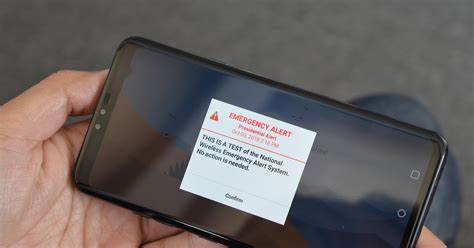While millions of people across the UK heard an alarm on their phones at 15:00 BST yesterday (Sunday), many others did not. The government was testing an alert that could be used to warn about dangerous situations including fires, flooding or terror attacks.
The alarm lasted for around 10 seconds on 4G and 5G devices, but many people on social media reported that the alert went off one minute earlier or later than planned, when a loud, buzzing alarm rang out and the words "severe alert" flashed up on their phones' screens.
Some, on the other hand, said they did not receive the alert at all.
A Cabinet Office spokesperson acknowledged that the alert did not reach some mobile phones, adding that it will be looking at the issue as part of its review of the test. The department also said engineers had spotted a trend of phone functions failing to work afterwards, adding that officials were in the early stages of analysing the results of the trial run.
Many users of the Three mobile network said they did not receive the alert. A spokesperson for the company later said it was aware that a number of customers did not received the test alert.
Andrew Hamilton, a member of the UK Youth Parliament for North Down, who is also blind, called the alert "inaccessible".
He said: "I use a screen reader but because of the alert sound, the screen reader couldn't tell me what the alert was about." The government had previously advised that those with 2G or 3G devices would not get the alert, along with phones that were off or in aeroplane mode.
People were further advised to ensure their phones had all the latest software updates, including iPhones running iOS 14.5 or later and Android phones and tablets running Android 11 or later.
People who do not wish to receive future alerts can opt out using their device settings.
Deputy prime minister Oliver Dowden warned beforehand that the alarm would be "a bit inconvenient and annoying", as well as "irritating". However, he added it "could be the sound that saves your life" in the future.
Mr Dowden also denied criticism the alert was an example of nanny statism, saying: "If you look at countries around the world, whether it is the United States, Canada, Japan and elsewhere, they have emergency alerts on phones as another tool in the toolkit of keeping people alerted during an emergency."
Drivers were warned not to pick up their mobile phones during the test as it would still be illegal. Drivers caught holding a phone behind the wheel face six penalty points and a £200 fine.
Meanwhile, the National Centre for Domestic Violence warned people with hidden mobile phones to turn off the alerts to avoid revealing the location of any secret devices. While the alert is intended to be used in emergencies in the future, some took to social media to poke fun at people who were surprised to see the alert flash up and hear the siren sounding on their phone.











